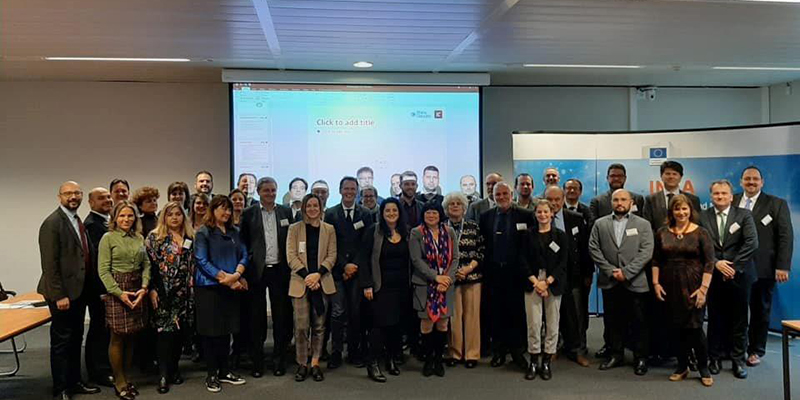The Danube Commission was represented at the 14 th Rhine-Danube CNC Forum in Brussels
The representatives of the Danube Commission, the Director-General of the Secretariat, Mr. Manfred Seitz, and Counsellor for development of cargo and passenger transport, ports and logistics service, Mr. Dejan Trifunovic, participated in the 14th meeting of the Rhine-Danube Core Network Corridor Forum and 11th Working Group meeting of ports and inland waterway managers of the Rhine-Danube Core Network Corridor Forum held in Brussels, on 20th November 2019.
The Rhine-Danube Corridor provides the main east-west link across continental Europe. Key projects, situated along the corridor, deal with all types of transport including improvements to the Good Navigation Status of the Danube River in all riparian countries.
The key objective of the meeting was to conduct a process analysis of the ongoing TEN-T CNC study regarding multi-modal transport market and new corridor parameters. The meeting worked out the details of current and future financing projects under the Rhine-Danube corridor. Representatives from INEA provided information on how the CEF supports projects along the corridor with breakdown by transport mode and year. Total CEF financing contemplated for the Rhine-Danube corridor is 3.9 billion EUR for 102 actions. Inter alia, they pointed out the need for early project preparation of the projects and presented current calls within the CEF program. The EC representatives further reported on future military mobility investment under CEF 2. It was noted that elements of the transport infrastructure shall be optimized for both civilian and military mobility, and that a total budget foreseen for the required investment is 6.5 billion EUR.
The first part of the day was devoted to the 11th Working Group meeting of ports and inland waterway managers. The main focus was on a shortage of new projects in IWW and ports in the Rhine-Danube corridor. Mr. Seitz emphasized navigation-related problems on the Romanian-Bulgarian, Slovak-Hungarian and Serbian-Croatian sections of the Danube that remain highly relevant up to 2030 when it comes to cost-efficient and safe navigation and therefore these projects require joint action for their implementation. The Danube Commission Secretariat intents to facilitate these cross-border projects regarding their application to CEF 2.
In discussions of current infrastructure challenges and common problems of all ports in the Rhine-Danube corridor, the DC Secretariat highlighted a pressing need for investments in the rail and road connections to Danube ports, the shortcomings of long-term port policies and port development strategies on national and international level, as well as future HRM problems in ports. The contribution to the progress of port capacity building and vision was pointed out through the implementation of the Interreg/DTP project DAPhNE (2017-2019) which will hopefully continue with the realization of the DIONYSUS project (2020-2022). More intensive cooperation with railway companies within the ports was proposed.
In scope of reporting tool for market observation, Mr. Seitz also praised the excellent cooperation between the DC and CCNR in general and in particular regarding the activities within the Market observatory report on inland navigation in Europe. He referred also to the quarterly market observation reports of the DC which are published on the website in three languages.

